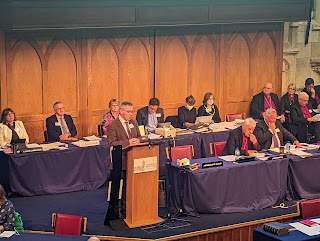We're divesting! But how will it be measured?
Full divestment coming from the @churchofireland! https://t.co/UZg4h1n5RF
— Bill McKibben (@billmckibben) November 30, 2020
"If you Google, ‘Energy sector performance 2019’, you read results like this, ‘Energy stocks are the biggest losers of 2019 -- and the decade’ 2020 has been even worse with major oil companies cutting dividends by two thirds.Investment and pension funds are at risk while they continue to hold fossil fuel stocks.
So, I was very pleased to read in the book of reports that, “The RCB is committed to divesting from companies involved in fossil fuel extraction by 2022, as per the motion passed by General Synod in 2018.”It is good to see that the policies on Environmental, Social and Governance, and on Climate Change, have been updated; and this is very welcome.On page 101 in The Climate Change Policy states that the committee has decided to fully divest from oil and gas companies that are, quote, ”not compatible with a two degrees alignment”.However, this is not the measurable target that was passed in the 2018 motion.The term ‘Alignment with two degrees’ is a noble aspiration, but it is vague.The Institutional Investors Group on Climate Change - of which the Church of Ireland is a member - said last year that the concept of aligning investments to the Paris Agreement limit of two degrees remains poorly defined.It is open to abuse from energy companies that market themselves as green but still operate with a turnover of 90% from oil and gas.As I finish, may I ask the chairman of the Investment Committee to confirm that the investment managers are working towards the measurable target set by General Synod - That by 2022 all companies with a turnover greater than 10% from fossil fuel extraction will be excluded?"
Discussion on the Report
Stephen Trew (Down and Dromore) commented on the investments. He said that the energy sector performance for 2019 had been the among biggest losers. He said he was pleased to read in the Book of Reports that the RCB is commited to divesting in fossil fuels by 2022 but asked for a firm commitment to the measures that were adopted at previous Synods.
Mr Saville replied that the investment committee is totally committed to fulfilling the obligation in totally divesting from companies with fossil fuel activities. He said there were different ways of measuring some of these things and differences in understanding on how this can be achived. “There is a common understanding that we are committed to moving towards that goal. There is no pullback in terms of the commitment given,” he stated. He suggested that if there was confusion over understanding it could be dealt with via direct communication between Mr Trew and the investment management staff.
Thankfully, I also had phone calls from senior staff in the Representative Church Body who clarified that a robust measure to exclude fossil fuel companies with any turnover from fossil fuel extraction or with existing reserves to achieve full divestment by 2022.



Comments